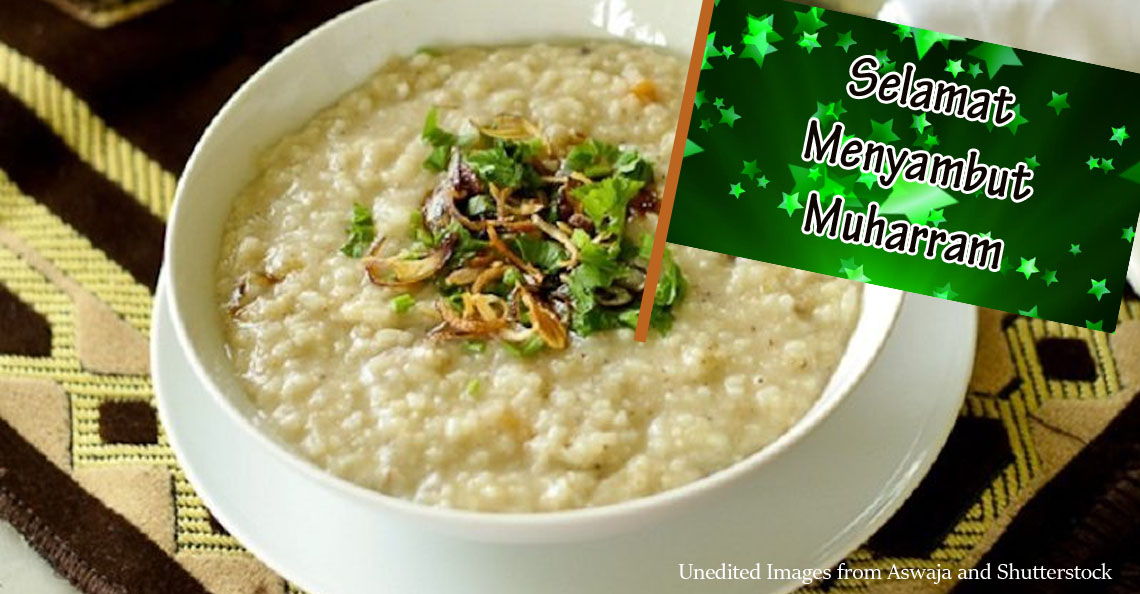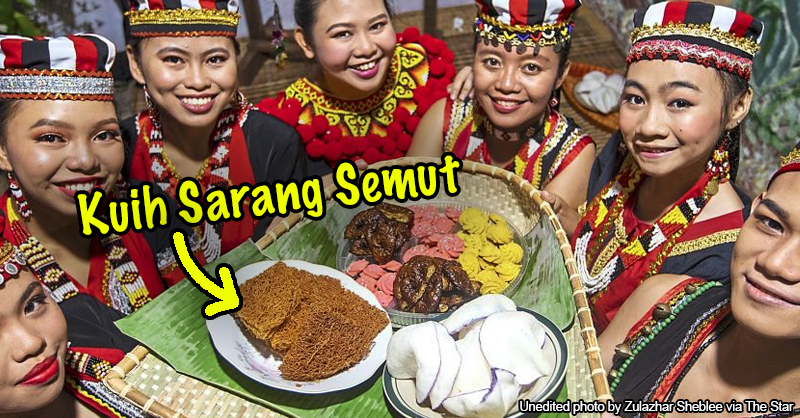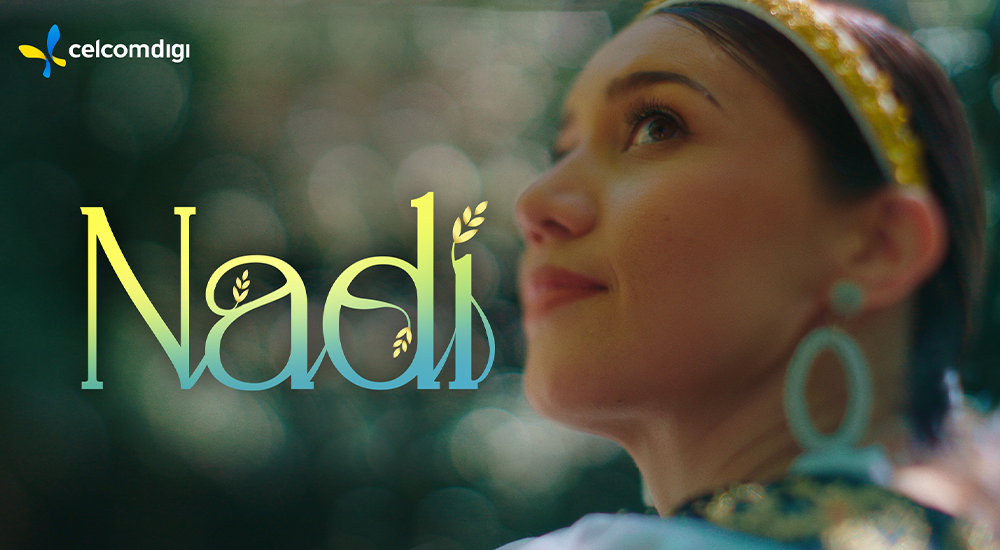9 public holidays that Malaysians maybe dunno how to celebrate

- 1.1KShares
- Facebook1.0K
- Twitter12
- LinkedIn13
- Email18
- WhatsApp26
Whuddup ugaiz!
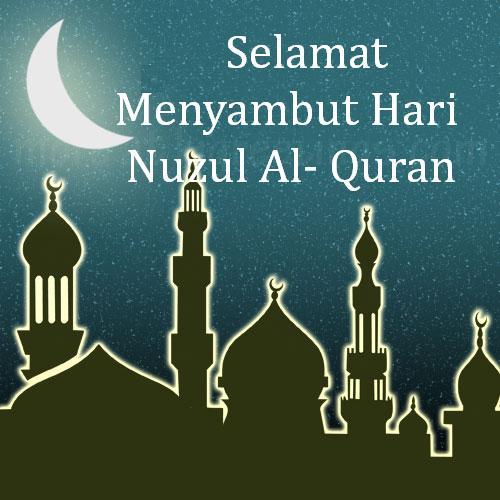
Didja know that Malaysia has one of the most public holidays in the world? According to wego.com, we have a total of 15 public holidays. And just cause we’re kiasu, you should know that Singapore only has 11 😛
On a wider angle, here’s how we rank worldwide:
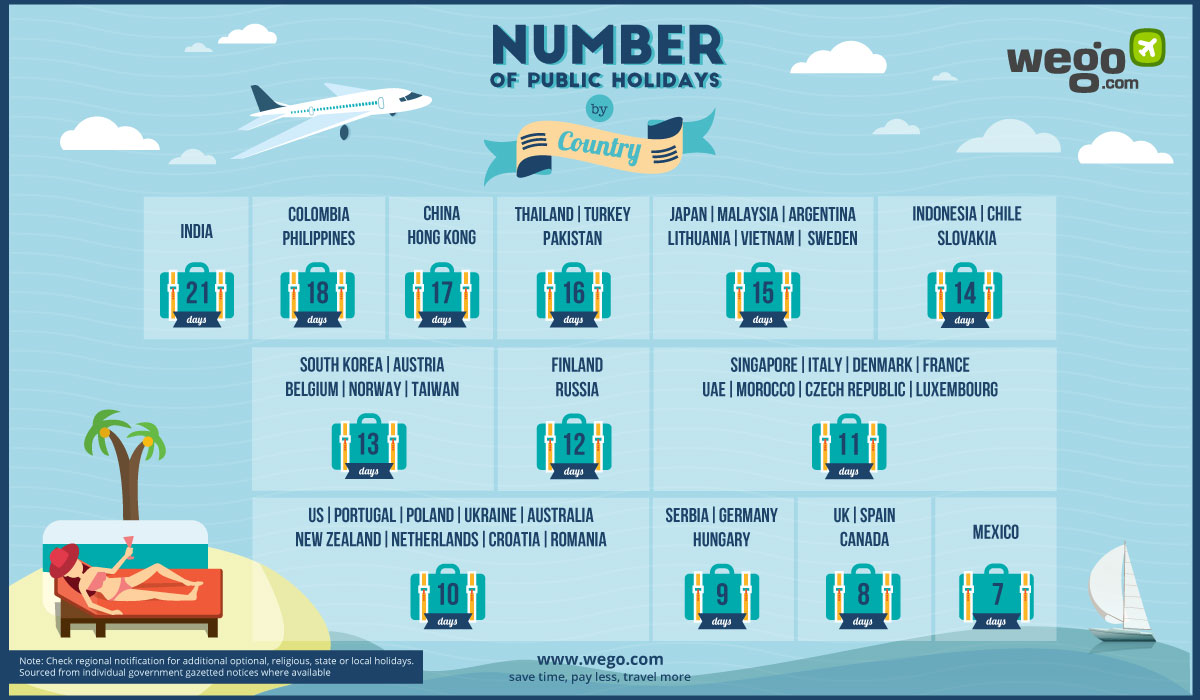
How did we even get to have so many public holidays? Well logically it boils down to our multicultural background, which has given us more than just holidays but all sorts of wonderful food, practices and… err… the occasional drama once in a while.
But while we enjoy these holidays, do we actually know what they’re all about?
We’re guessing most of you answered #1 or #2, but if our poll proves us wrong then CILISOS team really fail big time wei.
Anyway, with so much racial and religious tension going on nowadays, we can’t find a better time to encourage ugaiz to celebrate what makes us so special as a nation. So instead of just enjoying a day off for a holiday that may not have anything to do with your culture or home state, why not learn a thing or two about our differences in the spirit of unity?
1. Nuzul Al-Quran
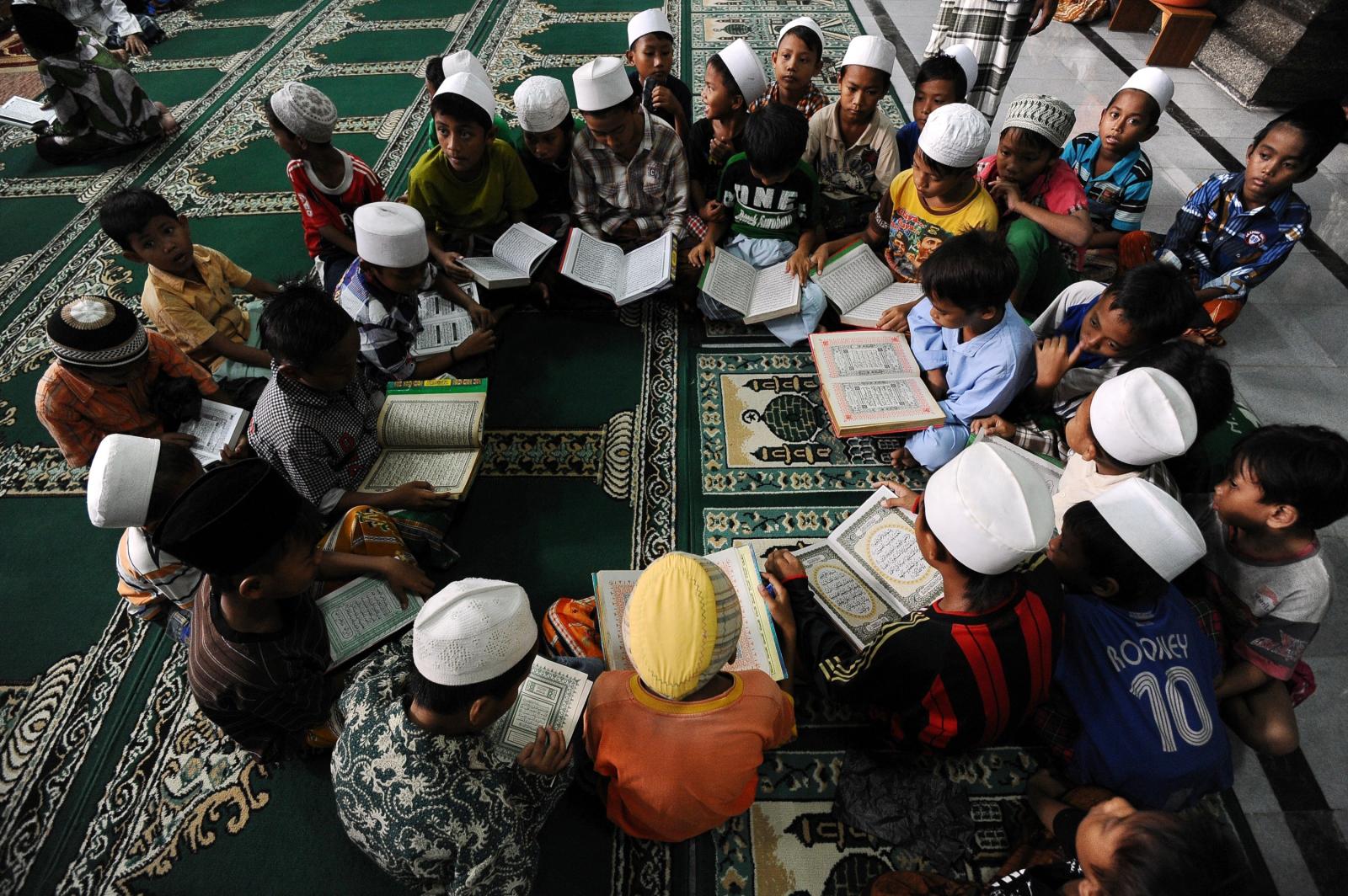
When it’s celebrated: 17th day of Ramadan (which is today!)
The purpose of Nuzul Al-Quran is to celebrate the first transfer of revelation of the Al-Quran verses to the Prophet Muhammad PBUH (Peace Be Upon Him) (and this happened on the 17th day of Ramadan). This transfer of revelation continued in stages for the following 23 years until the Al-Quran was completed. And it’s a very important event in the Muslim calendar because the Al-Quran is regarded as the greatest miracle ever of the Prophet Muhammad. But what were the verses that were given to the Prophet Muhammad?
“Read in the name of your Lord who created (all things). He created man from clot of blood. Recite! Your Lord is the most honourable One. Who, taught the human being, by the pen. He taught the human being what they did not know.”ÂAl-‘Alaq:1-5” – As quoted from daganghalal.com
These are referred to as the five verses from Sura Al-Alaq, the 96th chapter of the Al-Quran.
The only known countries that celebrate Nuzul Al-Qur’an are Brunei and Malaysia. On this day, Muslims attend seminars and sermons held at local mosques, communally break their fast, and also read the Qur’an in remembrance of the day of revelation.
2. Hari Hol
But first…
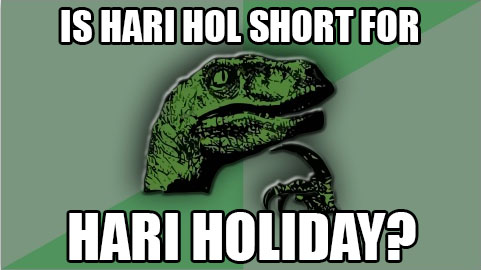
When it’s celebrated: Varies yearly but for 2015, it falls on 7th May (Pahang) and 15 Nov (Johor)
Seriously, what IS Hari Hol? We’re not the only ones wondering, too. Pahangites and Johoreans, who are the only ones officially observing this holiday, have been celebrating it for years and even they’re clueless. Some even think that it has to do with some padi-planting thingamajig.
A forum user mentioned that Hol comes from the word ‘Haul’, which in Indonesia is said to be a ceremonial ritual to remember someone’s death. Now, although Hari Hol is celebrated in Pahang and Johor, we couldn’t find much information about how it’s celebrated in Johor. As for Pahang, it commemorates the life, sacrifices and passing of the 4th Sultan of Pahang, Sultan Abu Bakar, who’s also the grand-daddy of our current Agong Sultan Abdullah!
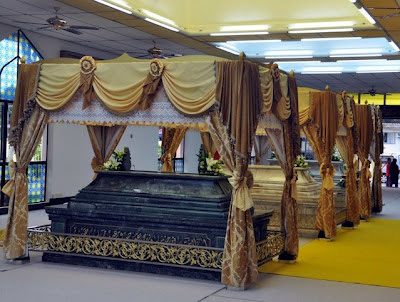
Image from tengkusyah.blogspot.com
See, Sultan Abu Bakar is dubbed the modern Sultan of Pahang ’cause he paved the way for political and social development, especially in the areas of religion and education. He managed to do all of this and more during the harsh times of the Japanese occupation.
Does Pasukan 136 (a.k.a. Force 136) ring a bell to anyone? If you do it’s prolly caused it’s in one of your Sejarah textbooks. Sultan Abu Bakar actually gave permission to secretly form a guerrilla army called Pasukan 136 to combat the Japanese soldiers at the time. For his numerous contributions to the state, Pahang-ites of the Muslim faith conduct majlis tahlil and bacaan Yasin, which are spiritual readings from the Qur’an, in various mosques and prayer rooms around Pahang.
3. Israk & Mikraj
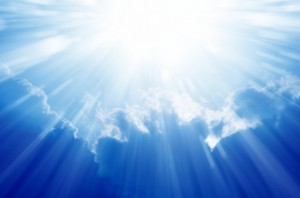
When it’s celebrated: This holiday commences on the 27th day of Rajab, which is the 7th month of the Islamic calender. In 2015, Israk & Mikraj was celebrated on May 16th.
If you haven’t heard of this holiday, you’re prolly not from Kedah, Perlis or Negeri Sembilan – states that actually observe this as a public holiday.
First off, here are the literal meanings of Israk and Mikraj in Arabic:
Israk – to travel at night; Mikraj – something one uses to go up.
These words are used in a religious context to refer to Prophet Muhammad’s journey from Mecca to Palestine and his ascent into heaven. During his journey, Nabi Muhammad travelled to all 7 realms of heaven until he reached paradise and managed to have a chit chat with God, who told him every Muslim person has to pray 50 times a day. However, the response he got from the people on Earth was that the number was too high. Therefore, he went back to paradise to negotiate with God and they both settled with having prayers 5 times a day.
During Isra & Mikraj, Muslims are encouraged to conduct religious activities such as recite the Qur’an and listen to ceramahs at their local mosques. The content of the ceramahs usually revolves around Nabi Muhammad’s experiences in heaven and his conversations with God.
4. Good Friday

When it’s celebrated: Unlike Christmas, there is no fixed date for this. In 2015, it was on April 3rd but next year it will be on March 26th. The date for Good Friday actually depends on the date for Easter. So, Good Friday will ALWAYS be the Friday immediately before Easter. So, when is Easter? Normally, it is the first Sunday after the first full moon occurring on, or after the Spring Equinox.
Good Friday is to commemorate the day Jesus Christ was crucified. It is celebrated by most Christians, but in Malaysia only Sabah and Sarawak gets a public holiday. This is because of the higher proportion of Christians in the East Malaysia. Bummer for the rest of us. Now, Christians includes various denominations i.e. Roman Catholicism, Presbyterianism and Methodism BUT not every Christian celebrate Good Friday. For example: Jehovah Witnesses and Mormons do not celebrate Good Friday due to their beliefs. Contrary to what some may think, Jewish people also don’t celebrate Good Friday, although it may coincide with their celebration of Passover.
How to celebrate: Celebrating the day of someone’s death?! Well, CILISOS don’t mean it to be a festive-balloon-releasing-fireworks-all-night type of celebration.
Each Christian denomination seems to have church services on Good Fridays. Furthermore, some followers may choose to fast on this day. For Catholics, it is mandatory to fast and abstain, however what amounts to fasting here differs from the Muslim’s way of fasting. For other denominations while there seems to be no such regulations they are encouraged to do so voluntarily .
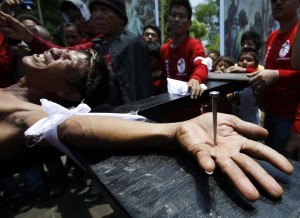
In the Philippines, some devotees actually go through crucifixion (seriously being nailed on the cross) or self-flagellation whipping yourself). But this practice is discouraged by religious authorities.
5. Awal Ramadan
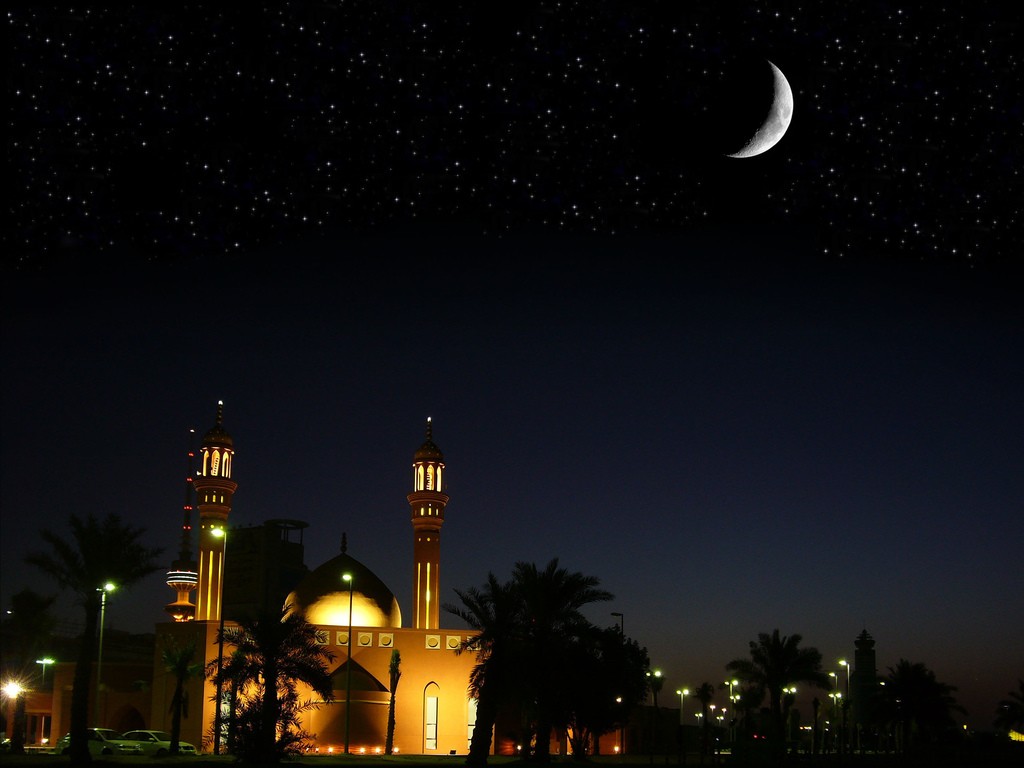
When it’s celebrated: At the start of the Ramadan month, changes every year. Celebrated 18th June this year.
To those living in Johor, Kedah, and Melaka, this day is a familiar holiday. For us in the Klang Valley, ‘awal Ramadan what?’ is the best we can muster. Honestly, no one had any idea what this holiday was all about to begin with, and we are still struggling to wrap our heads around it.
Realising that we were missing out on a potential holiday, we scoured the net for a good four hours, but couldn’t find much on what was done on this day in terms of celebration. So we decided to do the next best thing: call someone who might know.
Apparently, on this day the usual order of things apply: fast from dawn to dusk and pray. Why it’s a holiday, we do not know. Maybe they’re hipster like that? (Just joking la!)
Quick bits time: Awal Ramadan represents the start of the fasting month for Muslims across the globe. Due to the unique nature of the lunar calendar which the Muslim calendar is based, the commencement of Ramadan itself varies annually – going back about 11 days every year. This year it fell on the 18th of June, and next year begins on the 7th of June.
6. Awal Muharram
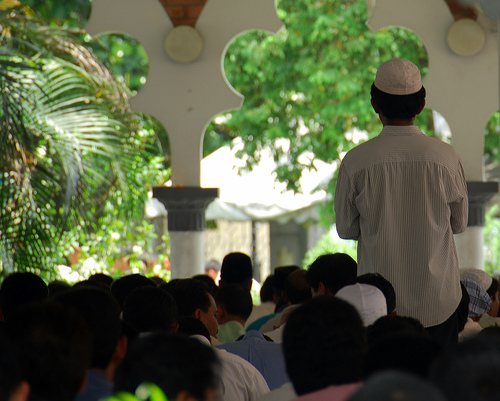
When it’s celebrated: Changes according to the lunar calendar, but will be celebrated on 14th October this year.
Don’t get confused with Awal Ramadan. Yes they both have ‘awal’ in it but they’re very different in nature.
When you think of New Year celebrations, fireworks, loud music, and broken resolutions are the first things to come to mind. However, for the 1.6 billion Muslims who will usher in the new Muslim year on the 14th of October this year, the objectives have shifted from pleasure to a month of mourning and peace.
Awal Muharram, also known as Maal Hijrah here in Malaysia, is the most anticipated month in the Muslim calendar after Ramadhan. The month of Muharram represents a number of important events that have taken place in Islamic history. The name of the month is derived from the word ‘haram’ when it is forbidden for Muslims to fight or wage war.
The first day of Muharram coincides with the emigration of Prophet Muhammad from Makkah to Madina in order to avoid persecution. It is also a month to remember the martyrdom of Hussein ibn Ali, the prophet’s grandson. Shia Muslims flog themselves to commemorate his martyrdom. On the 10th day of the month, Muslims honour the rescuing of the Israelites from the Pharoah by Moses.
To mark the beginning of a new year, Muslims will attend religious activities, religious meetings across the country, and sing nasyids. Also, the Qur’an is recited in mosques and prayers are held to commemorate the month.
7. Harvest Festival a.k.a Pesta Kaamatan
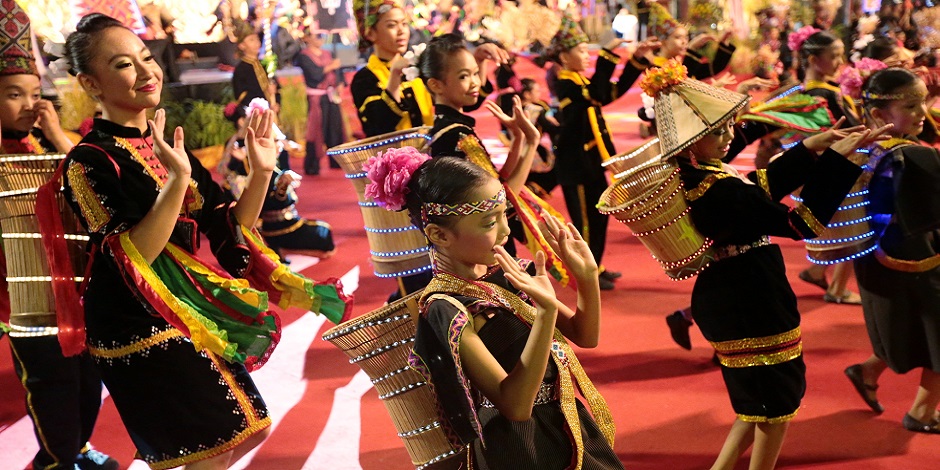
When it’s celebrated: It is celebrated by Sabahans throughout the month of May, but the highlight is on the 30th and 31st of May at Hongkod Koisaan, Kadazandusun Cultural Association Hall in Penampang.
Normally celebrated by the Kadazan-Dusuns, the Harvest Festival is a massive festival Sabah. What’s it about? Well, it’s to give thanks to the spirit of the paddy (Bambarayon) for the harvest and to remember the sacrifices of Huminodun for the rain. If you want the full story, check out Projek Dialog’s page.
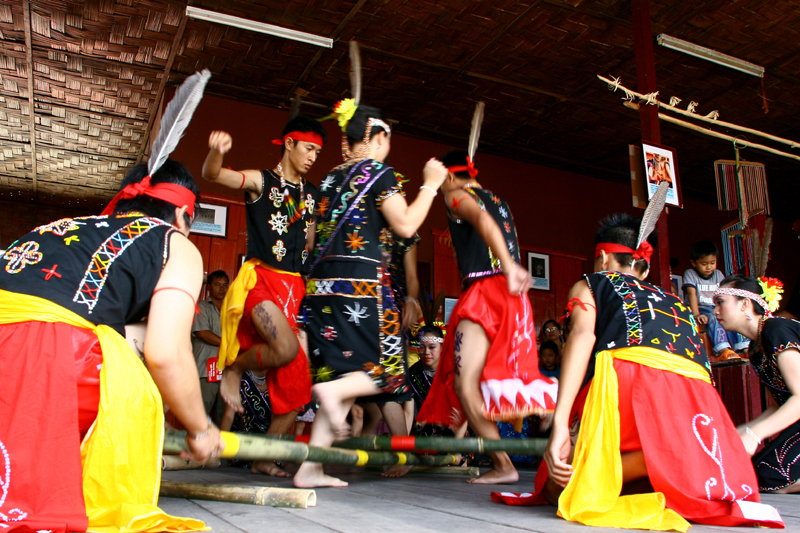
The term Kadazan-Dusuns unites two indigenous tribes in Sabah – the Kadazans and Dusuns, as well as being a collective-term for the other 40 sub-ethnic groups in Sabah. And although a lot of Sabahans have converted to Christianity and Islam, they still hold on to such beliefs.
How does one celebrate it, though? Just like on New Year, you greet everyone “Happy New Year”. Likewise, here the Sabahans greet each other ‘Kopivosian Tadau Ka’amatan’ or ‘Selamat Hari Menuai’.
The celebration starts off with rituals performed by the bobohizan, or high priestesses. There are 7 rites to it, including inviting the spirit of the paddy, appeasing, and thanksgiving.
The celebration is followed by the usual festival must-haves: a good traditional food feast with plenty of tapai, traditional performances like Sumazau and even a beauty pageant known as Unduk Ngadau. The Unduk Ngadau beauty contest was to serve as a memorial to Huminodun, so beauties are selected based on who would best resemble the ascribed personality of Huminodun. ‘Unduk Ngadau’ comes for the word ‘Runduk Tadau’ which means ‘the girl crowned by the sunlight’.
There are also competitions like buffalo races, mamarampanau (walking on bamboo stilts) and even arm wrestling. Talk about a real party!
8. Hari Gawai
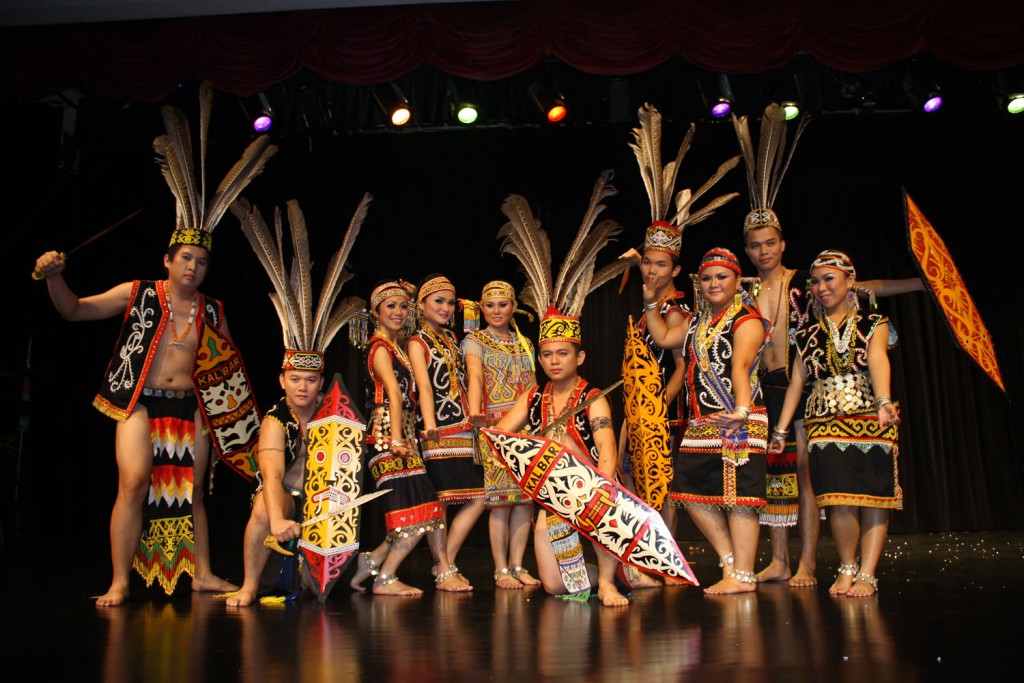
When it’s celebrated: 1st and 2nd June of every year, but usually lasts for the entire month.
Now onto Sarawak… Hari Gawai, a.k.a. Gawai Dayak, is a festival for all ethnicities in the state. Although it starts on 1st June, for many, it starts on the evening of 31st May itself with rituals to cast away evil spirits and to invite the deities to the feast. The first Gawai was hosted before being officially gazetted in 1963, but many attributed the idea to a radio forum back in 1957. Stephen Kalong gazetted this as a public holiday in Sarawak when he became the Chief Minister in 1964.
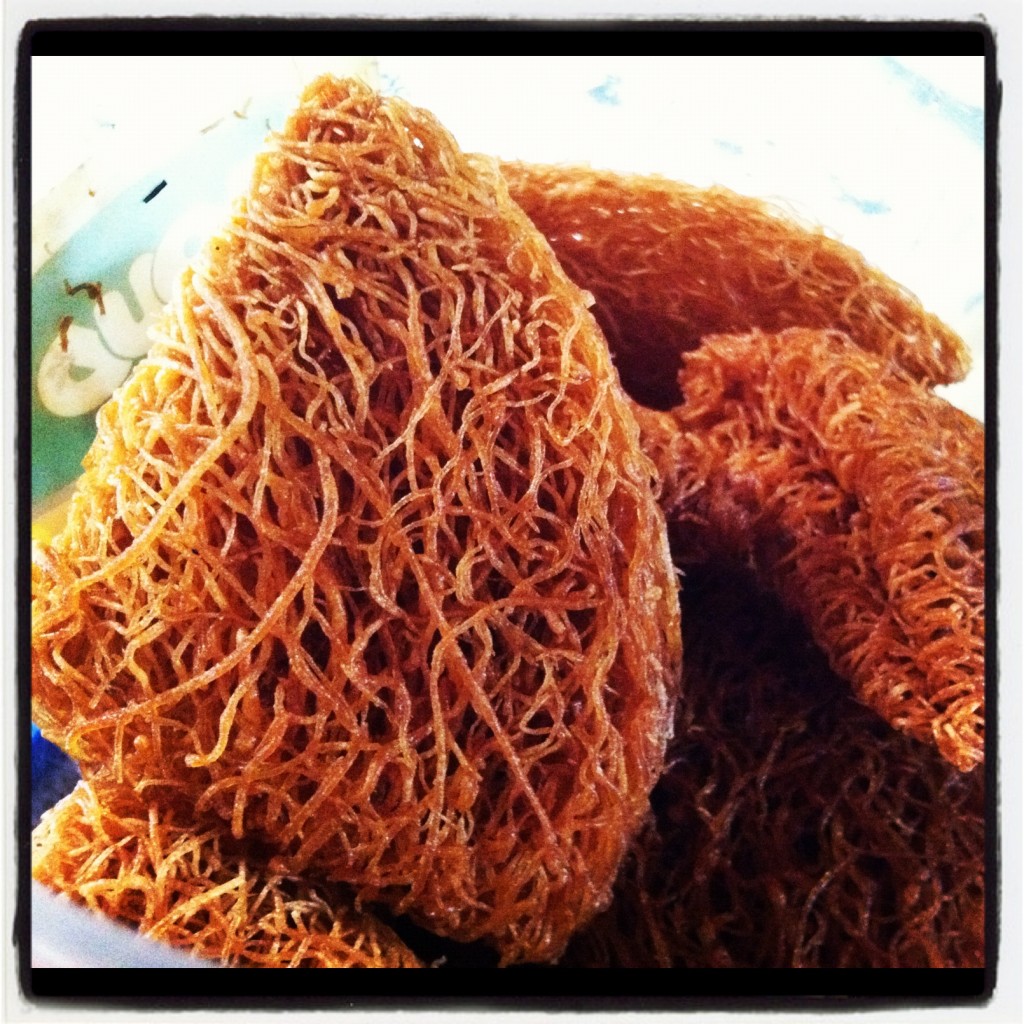
Before the big celebration, any wild animal parts like the horn, teeth and feathers will be used to decorate and repair their traditional costumes. And for food, traditional cakes such as ‘sarang semut’ (a honeycomb-like texture resembling an ant’s nest), ‘cuwan’ (molded cake), the crunchy ‘kuih sepit’ and ‘penganan iri’ (discus-shaped cakes) are made several days ahead of celebrations. Tuak (rice wine), the traditional drinks of Dayak would be brewed and distilled a few weeks earlier.
While there are celebrations in towns and cities, nothing can beat the atmosphere in a longhouse. At longhouses, Gawai Dayak means a gathering for all ages, with the ‘ruai’ (front public veranda) coming alive with music coming from traditional drums, ‘ngajat’ and pantun. There would also be tons of food ranging from smoked meat to fermented fish to ‘ensabi’ vegetables .
The festival usually lasts till the end of June, with the closing ceremony signified by symbolically rolling up of a mat by each family within the longhouse. It is popularly known as “Ngiling Bidai” among the Iban Dayaks. Why? In the Iban language, tikai is a mat, and to roll it up is to ngiling it. So rich in culture, kan?
9. Wesak Day
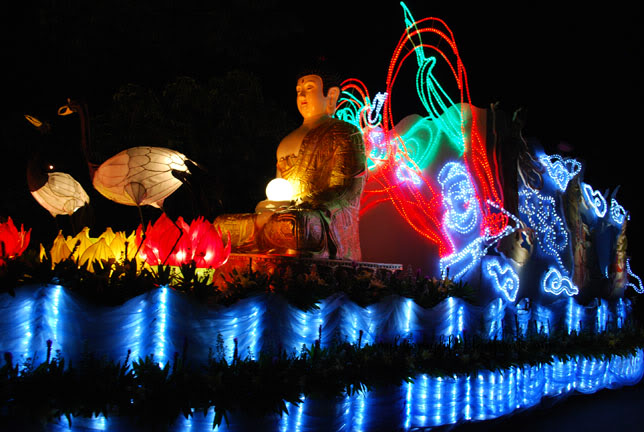
When it’s celebrated: Specific date varies around the world ‘cos it’s celebrated any day in May when the full moon can be observed. This year, the official date of Wesak Day fell on 3rd May 2015 in Malaysia.
You know of Prophet Muhammad’s birthday, Christmas Day… but didja know about Buddha’s birthday? Enter Wesak Day, a worldwide Buddhist event which celebrates the the birth of Buddha as well as honour his enlightenment (nirvana) and eventual passing (Parinirvana).
The first thing you’ll notice during Wesak Day is….. TOTAL MADNESS TRAFFIC JAM.

That’s right. On Wesak Day, you’ll see humongous floats lining up roads, but what members of other faiths don’t know that it is so much more than just a parade.
During the day, devotees gather at temples across the country for a mass meditation ceremony on the Eight Precepts.This is followed by a candle procession and offerings of prayers, joss sticks and incense.
Another important element of Wesak Day is the bathing of Buddha’s statue. Devotees will patiently wait in line to carry out this ritual as it signifies the purification and renewal of one’s soul. After all that is done, all devotees will come together-gether to makan a simple vegetarian meal. What was cool about this year’s celebration is that Malaysian Buddhists paid their respects to the victims of the earthquake in Nepal, which is considered the birthplace of Buddha.
Wah! So many public holidays in Malaysia!
Yeah, so say thanks to your fellow Malaysians for that day off you’re getting! (Not today la since Nuzul Al-Quran is on Saturday… but nehmind, Hari Raya coming up.)
Like we said, it’s our multicultural background that gave us this awesome treat, so instead of just casually enjoying it, now you can share these special days with friends who celebrate ’em. We already know about the major holidays (and have all been guilty of putting on a few extra pounds then), but we reckon learning more about each other will do more good than harm, if any at all. 🙂
This story was compiled and written by new CILISOS interns Wong Sue Ann, Letitia Lim and Khalil Majeed.
(In other words, be nice ok? Heh 😀 )
- 1.1KShares
- Facebook1.0K
- Twitter12
- LinkedIn13
- Email18
- WhatsApp26

